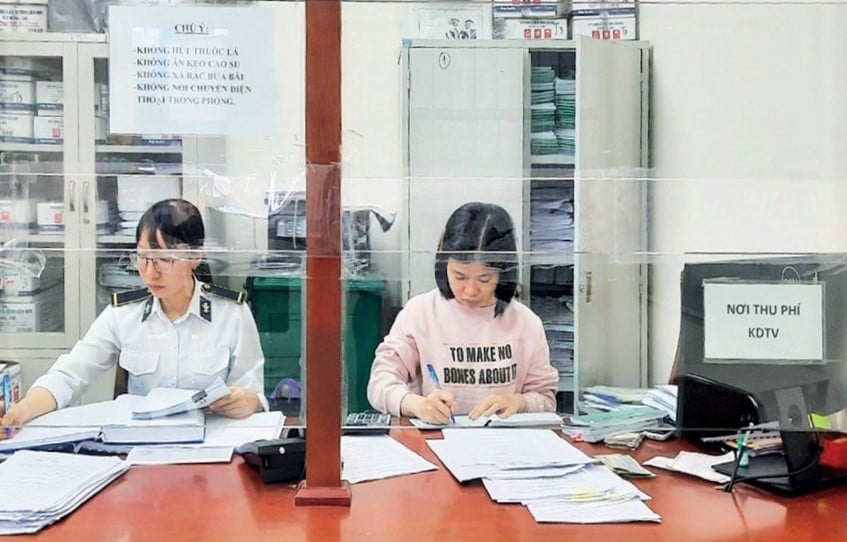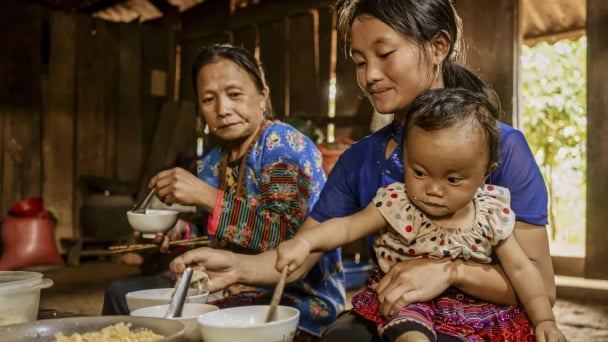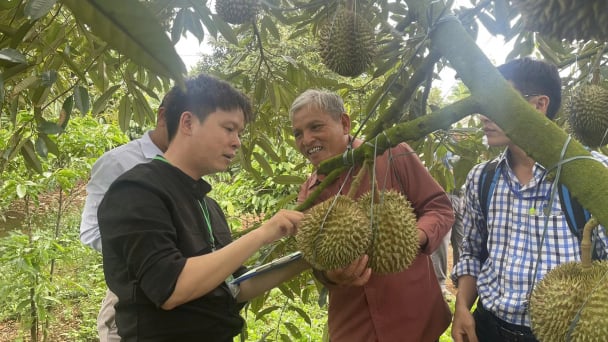June 2, 2025 | 04:50 GMT +7
June 2, 2025 | 04:50 GMT +7
Hotline: 0913.378.918
June 2, 2025 | 04:50 GMT +7
Hotline: 0913.378.918

In 2022, MARD’s public administration reform index ranked 7/17 ministries (up 4 places compared to 2021). Photo: Nguyen Huan.
According to the Steering Committee for Administrative Reform under the Ministry of Agriculture and Rural Development (MARD), in 2022, MARD and its units have made great efforts in directing and administering, as well as deploying the implementation of the task of public administration reform (PAR) effectively.
Regarding the results of the evaluation and determination of MARD’s public administration reform index (PAR index) in 2022, the Ministry of Home Affairs has presided over the appraisal, synthesis, evaluation, and ranking of MARD’s PAR index, which ranked 7/17 ministries (up 4 places compared to 2021).
To be more specific, the Ministry's PAR index in 2022 reached 86.37, above the average value of 84.05 (2.32% higher). Of which, the appraisal score was 60.62/68.50 points (reaching 88.5%) and the sociological survey score was 25.75/31.50 points (reaching 81.75%).
Especially, MARD has made important and positive changes in institutions, mechanisms, policies, public administration reform, public finance reform, apparatus organization reform, etc. Besides, the application of information technology to promote the development of e-government and digital government by the Ministry and units is also focused on.
In particular, some units have been innovative and creative in performing PAR tasks. The Ministry’s Steering Committee for Administrative Reform, in collaboration with the Center for Digital Transformation and Agricultural Statistics, has built, maintained, and operated the PAR Website effectively and practically and has updated and published information and documents in a timely and quick manner.
The work of PAR inspection and specialized inspection continued to be promoted, contributing to detecting shortcomings and limitations in the implementation of PAR in the units. At the same time, it helps units overcome their weaknesses and provide solutions for effective operation.
The year 2022 is also the first year of implementing the project "Determining the PAR index of ministries, ministerial-level agencies, and People's Committees of provinces and municipalities in the period of 2022–2030,” with many new criteria and component criteria included in the assessment to be consistent with the PAR master program in the period 2021–2030, as well as with the new directions of the Government and Prime Minister on PAR.
In the results of the PAR index in 2022, the ministries and ministerial-level agencies have three groups of scores. MARD is located in a group of 11 units that achieve a PAR index result ranging from over 80% to less than 90%. In addition, the Ministry has three high-achieving component indexes (ranking 5/17 ministries), which are direction and administration, administrative procedure reform, and especially public finance reform (up 8 places, ranking 2/17 ministries). Besides, the Ministry also has three indexes that increase the ranking compared to 2021, including institutional reform (up 3 places, ranking 9/17 ministries), apparatus organization reform (up 2 places, ranking 11/17 ministries), and civil service regime reform (up 4 places, ranking 6/17 ministries).

The MARD’s public finance reform index increased 8 places, ranking 2/17 ministries. Photo: Trung Quan.
The detailed analysis of seven component indexes shows that MARD’s component index of “PAR direction and administration” achieved more than 96% (the achieved score is 11.06/11.50 points). The component index of “institutional reform” reached more than 80% (13.30/16.50 points). The component index of "administrative procedure reform" reached nearly 95% (15.64/16.50 points). The component index of "apparatus organization reform" reached more than 88% (10.63/12 points).
The component index "reform of the civil service regime" reached approximately 91% (14.99/16.50 points). The component index of "public finance reform" reached more than 92% (11.05/12 points), and the evaluation results showed that the Ministry of Agriculture and Rural Development is one of the three units in the same group as the Ministry of Finance and the State Bank of Vietnam that achieve the highest component index. The component index of "building and developing e-government and digital government" reached more than 64% (9.70/15 points).
The newly issued PAR index includes two evaluation criteria sets for the ministerial and provincial levels. The Ministry-level PAR Index is used to evaluate and rank 17 ministries, ministerial-level agencies, and 2 specific agencies (the Government Inspectorate and the Committee for Ethnic Affairs), including 7 evaluation fields, 38 criterion, and 97 component criterion.
The total evaluation score is 100 points, of which 31.50 points are assessed through a sociological survey. To deploy, evaluate, and determine the PAR Index in 2022, the Ministry of Home Affairs conducted a survey of more than 86,000 votes, including 36,095 votes from the people and 50,109 electronic questionnaires to survey groups of civil servants, leaders, and managers at all levels at ministries, agencies, and localities.
Translated by Huyen Vu Thu

(VAN) 30 experts in health, agriculture and environment participated in a consultation workshop to inform the development of a methodological framework aimed at supporting Vietnam’s transition to a sustainable food system.

(VAN) Over the past five years, Quang Ninh Province has vigorously and synchronously implemented the ‘Say No to Plastic Waste’ campaign, yielding positive outcomes in advancing sustainable tourism.

(VAN) The prevention of plastic pollution necessitates collaboration among governments, businesses, and citizens. Today's little things contribute to a future free of plastic.

(VAN) This was the directive given by Deputy Minister Phung Duc Tien during a meeting with the Department of Livestock Production and Animal Health, and relevant stakeholders to prevent and control African swine fever.

(VAN) For the durian industry to succeed, the value chain must fulfill its commitments to the government, the community, and international partners.

(VAN) Vaccinating juvenile pangasius helps reduce disease, antibiotic use, and farming costs, increasing profits for export-oriented farmers in An Giang.

(VAN) Due to a limited supply of workforce and competitive recruitment requirements, businesses struggle to retain talented veterinary human resources.